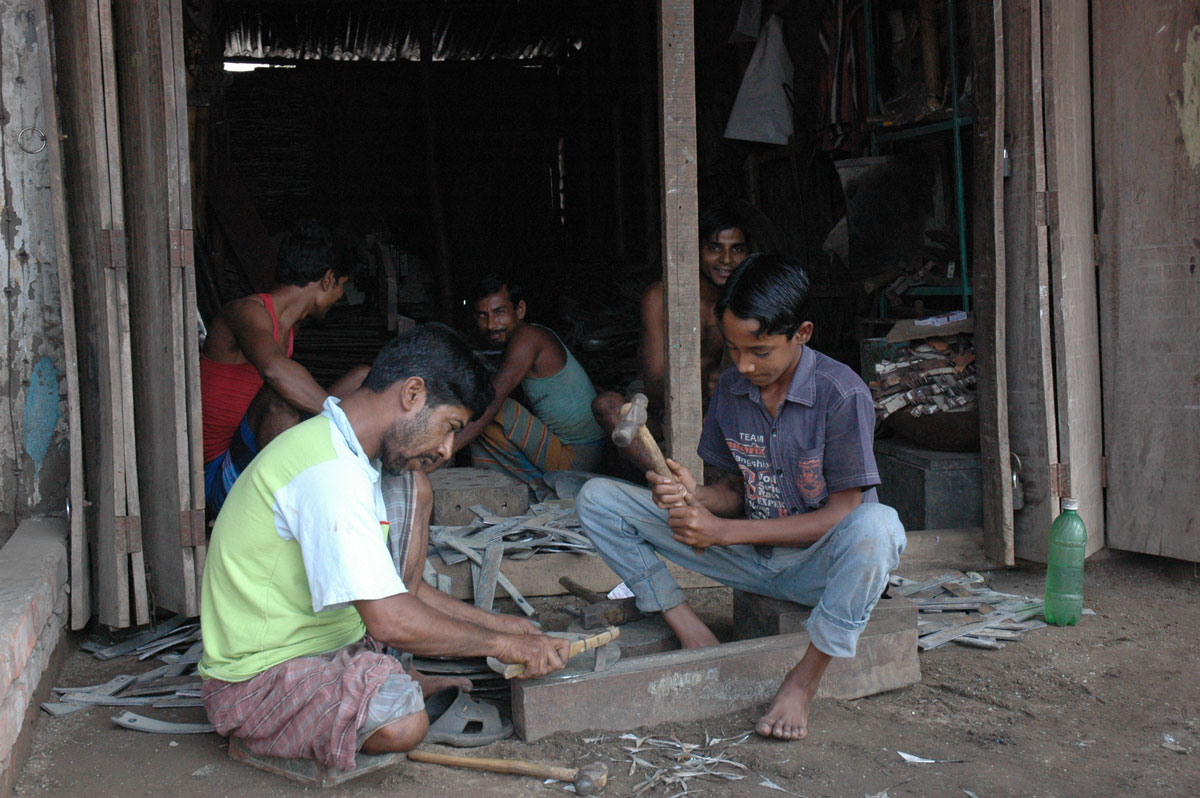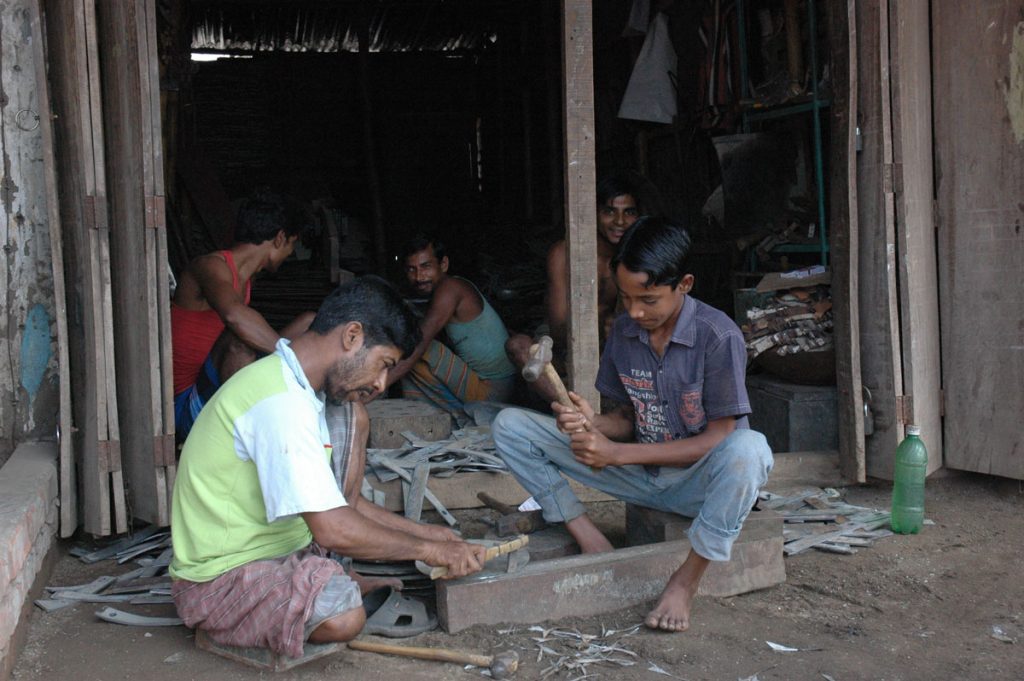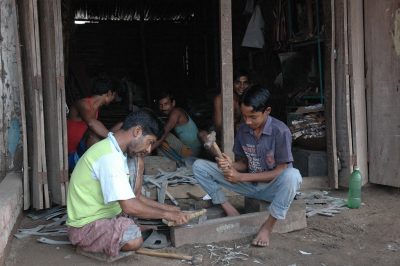Introduction and key facts
The SCIP Plastics project stands for Sustainable Capacity building to reduce Irreversible Pollution by Plastics. The project supports the sustainable transformation of municipal waste management systems in the Ganges Delta. It promotes the development of plastic abatement strategies, as well as demand- and resource-oriented collection and disposal, in order to prevent large-scale environmental pollution at its source. The tangible project objective is the long-term establishment of a Knowledge Transfer Hub on the campus of the Khulna University of Engineering & Technology (KUET) for the reduction and prevention of marine plastic debris in the Bay of Bengal. The SCIP Plastics project is a collaboration between the German partners Bauhaus-Universität Weimar and the ISOE – Institute for Social-Ecological Research and the Bangladeshi partners KUET, Chittagong University of Engineering & Technology (CUET) and Khulna City Cooperation (KCC)
Funder
Federal Ministry for the Environment,
Nature Conservation,
Nuclear Safety and Consumer Protection (BMU)
Duration 12.2021 – 05.2025
Country Bangladesh
Location Khulna
Volume € 3.9 million (BUW 32%, KUET 33%, ISOE 17%, KCC 12%, CUET 6%)
Project country
With 164 million inhabitants and 1,100 inhabitants per square kilometre, Bangladesh is the most densely populated country in the world and, due to its location in the Ganges delta, one of the top 10 marine plastic polluters. The country has been listed as a Least Developed Country by the United Nations since 1975. Currently, about 47% of the urban population lives in slums (2018). Little can be done to counter plastic pollution through water bodies due to dysfunctional waste management systems. Without countermeasures, plastic pollution will continue to increase due to rapid growth, improved connectivity and monsoon-related extreme weather events. Approximately 40% of Bangladesh’s land area is below 10 m above sea level, inhabiting 46% of the population. The country is strongly affected by the world’s most populous river delta. The target region of Khulna is the largest urban area within the delta, neighbouring the Sundarbans, the largest contiguous mangrove forest and a UNESCO World Heritage Site. It is estimated that the daily average quantity of waste generated in Khulna is 0.3 kg/person, which corresponds to app. 480 tons per day. Presently, open spaces on roadsides are used to store the wastes. The collecting is challenging, significant amounts of waste remains unhauled from various points and causes several problems, such as odour, diseases or the washing in nearby canals.
Bangladesh’s annual export of trades and services increases constantly from 6.6 Billion US$ (2000) to 18,5 Billion US$ (2010) to 46.4 Billion US$ (2019). The port of Chattogram already handles 90% of national exports, resulting in 3 mill. TEU (Twenty-foot equivalent unit) in 2019. The Bay of Bengal provides the sea link between South and Southeast Asia and the silk route causing rapid economic boost in Bangladesh’s ports. In Mongla Port, the second biggest port, container terminals are yet being built (2024 – 2025), which besides its location in the Sundarbans and its medium size qualifies it as a prevailing model investigation area for plastic waste abatement.
Outputs
Output I: Establishment of a Knowledge Transfer Hub at the KUET campus. The hub unites stakeholders contributing the capacity building against plastic pollution, decision-making and the introduction of social and technical competencies that enable the management and guidance of the working groups (outputs II – VI). The hub coordinates the project’s resources and bundles results from the overarching elaboration of master plans. As an integrative body the hub unifies, matches and communicates the results to the management and for external awareness. The KCC does not currently maintain its own waste department, but due to the deep interconnection with universities, industry, politics, society and communal authorities the hub will continue to exist as a municipal waste department and national competence and research centre, think tank and national contact point for plastic pollution prevention.
Output II: Secondary disposal points assessment. Based on a comprehensive status analysis of locations, classification and composition of the existing urban collection points, measures for the reorganisation of distribution and collection will be developed within a master plan. In a pilot project, four representative collection points for all types of household wastes like recyclables, organics and mixed waste are set up in distinctive structural areas of the city via participatory mapping considering also informal recycling demands. Constructed and operated by KCC the results are evaluated by a scientific accompanying study at the Hub. The best-practice example will provide multipliable instructions of action of secondary disposal point nationwide improving plastic waste recovery rates.
Output III: Recycling-Shops assessment. Following the waste recycling route, significant plastic waste pollution is generated in the sorting, processing and reselling of plastic recyclables. Rejected and sorted out non-recyclable plastics without resale value enter the open environment highly concentrated at recycling shops. Based on a social-economic exploration and market analysis a business model will be developed in coordination with ISOE and KCC. The aim is to capture fractions that are worthless for the recycling process such as PVC, PLA, PS with difficult textures, colours, contaminants, impurities or particles smaller than 2cm at the sources, namely in the recycling stores, where high waste streams aggregate. Key is the elaboration of business incentives for targeted collection and provision while balancing additional expenditures for KCC providing safe treatment and deposition. Challenges and opportunities lie in the synergies that need to be transferred into a win-win business model, which overall prevents open and uncontrolled pollution of plastics.
Output IV: Landfill assessment. An uncontrolled landfill without safety monitoring is a significant source of open plastic pollution. Special attention will be paid to the final stage of plastic recycling around the landfill site. Manual scavenging and reselling of recyclables on site is a common informal employment that potentially exposes workers to hazardous and dangerous working conditions. Planned pilot measures, must ensure a secure livelihood for the informal sector and prevent targeted emission paths around the landfill. For this reason, counter measures are developed and only implemented and evaluated by the interdisciplinary consortium in consultation with the informal sector on site.
Output V: Case Study Mongla Port. The objective is to investigate the initial assumption of imminent significant plastic pollution from harbours. Based on a waste analytical analysis, potentials are estimated, countermeasures are developed and a transferability to the largest port of Bangladesh in Chattogram is evaluated.
Output VI: Plastics substitution potential by Jute. Similarly, the presupposed assumption of a sustainable plastic substitution by local jute is investigated with a comprehensive life cycle analysis. For favoured jute substitution, potentials of selected products will be evaluated in model projects.
Impact on SDGs
SDG Description
„End poverty in all its forms everywhere“
SCIP Plastics support for the goal
Strengthening the most vulnerable informal sector in waste management systems.
SDG Description
„Ensure inclusive and equitable quality education and promote lifelong learning opportunities for all“
SCIP Plastics support for the goal
Based and led at the university, the project contributes to the education and training of students in environmental planning and engineering related disciplines.
SDG Description
„Achieve gender equality and empower all women and girls“
SCIP Plastics support for the goal
Strengthening equality in leadership positions. Overcoming dependencies, disadvantages and stereotypes in the private recycling sector.
SDG Description
„Ensure availability and sustainable management of water and sanitation for all“
SCIP Plastics support for the goal
Surface and groundwater protection from pollution. Keeping operational sewer systems free from garbage clocking.
SDG Description
„Promote sustained, inclusive and sustainable economic growth, full and productive employment and decent work for all“
SCIP Plastics support for the goal
Improve working conditions in the formal municipal waste sector and the private recycling sector.
SDG Description
„Build resilient infrastructure, promote inclusive and sustainable industrialization, and foster innovation“
SCIP Plastics support for the goal
Strengthening the regional value chain, local production and public services.
SDG Description
„Make cities and human settlements inclusive, safe, resilient, and sustainable“
SCIP Plastics support for the goal
Participatory improvement of living conditions and urban planning processes.
SDG Description
„Ensure sustainable consumption and production patterns“
SCIP Plastics support for the goal
Investigation and awareness rising for resource orientated and responsible life style and products.
SDG Description
„Conserve and sustainably use the oceans, seas and marine resources for sustainable development“
SCIP Plastics support for the goal
Long-term project impact to protect marine habitats from plastic pollution.
SDG Description
„Protect, restore and promote sustainable use of terrestrial ecosystems, sustainably manage forests, combat desertification, and halt and reverse land degradation and halt biodiversity loss“
SCIP Plastics support for the goal
Imminent protection of the coastal region and the particularly vulnerable mangrove forests from pollution.
SDG Description
„Strengthen the means of implementation and revitalize the global partnership for sustainable development“
SCIP Plastics support for the goal
Expansion of the German-Bangladesh university partnership and cooperation with national federal implementing organisations within the field waste management.



